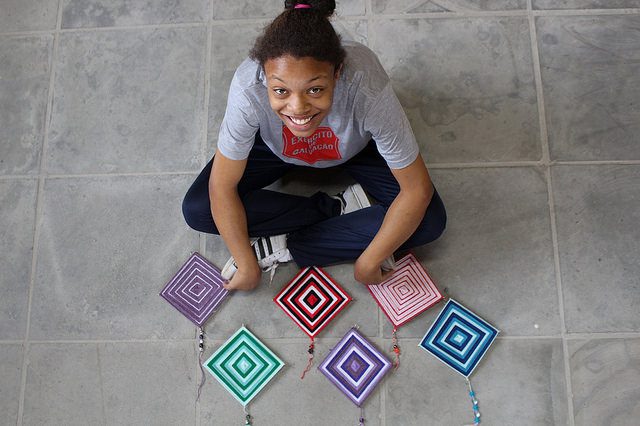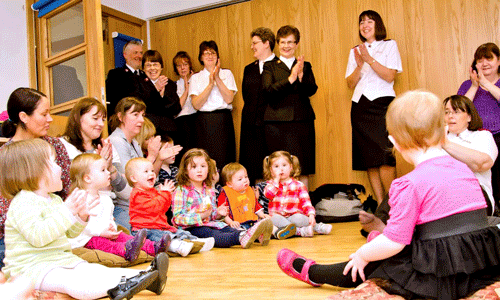My cast as a teacher
by Robert Docter, Editor-In-Chief –

June 25 was a pleasant day on Pine Street—around 7:30 in the morning, about 70 degrees, slightly overcast with the promise of a brilliant sun. I was walking back to the office with a colleague from New Frontier. We’d just finished a delightful breakfast, planned the day’s activities, and were striding purposefully back to the Army’s Long Beach Territorial Headquarters.
Suddenly, my left foot hit some very slippery, wet sidewalk. I tried to catch myself, twisting slightly to avoid the water, and then settled into a very awkward crouch with my right ankle turned in a strange direction delivering a lot of pain.
My colleague had tried to catch me, to no avail. A kind young man tried to lift me up, and with help from both of them I finally stood erect on one leg, holding the other gingerly off the ground. It was then I noticed the little sign warning me of the wet sidewalk.
The young man took off. My friend supported me during the very long and painful two blocks back to the office.
The pain only got worse. I finally canceled some meetings, delegated some further actions, and struggled down to my car. I drove home. Upon arrival, Diane insisted I go to the doctor and get the leg x-rayed. All I wanted to do was lie down, but she prevailed, and my daughter drove me to the medical center.
The doctor heard my story while discovering some “tenderness” above the ankle. She dispatched me immediately to x-ray in a wheelchair. The technicians took their pictures, looked at them and then rushed back to the uncomfortable table and told me to lie still—“Don’t move,” they said.
“Uh-oh,” I thought, and complied.
One of them wheeled me back to the doctor who looked at the x-rays, pondered a moment, and said: “Yes—just what I thought. You broke your fibula. In one way you’re lucky. It’s not your tibia—the load bearing bone, and we’ll be able to put you in a walking cast.”
A cast at the beginning of summer—this was not what I wanted to hear.
Shortly thereafter, the “cast man” arrived with his rolls of fiberglass bandage that he wound around my leg from toe to knee. I was too discouraged to argue.
The cast has slowed me down considerably—it’s a drag. The leg doesn’t hurt anymore, and I’m for taking it off. The medics say, “This takes time—might be another month—but remember—it’s your leg. Losing the cast too early could cause serious damage and hold you back.”
I recognized the consequences and agreed.
So what!
“So what?” you say—just read on.
All of us move through life in the process of relapse prevention—trying to avoid the “slips” that turn into negative setbacks. By the way, another word for “relapse” is backsliding. If we’re not becoming better people, all of us are somewhere in the relapse process. We can’t get home alone. We all need help.
My help comes from the Lord, the maker of heaven and earth.
He will not let your feet slip—he who watches over you will not slumber.
Psalm 121
Over this past month, my cast has taught me some valuable lessons about relapse prevention:
Avoid dangerous territory.
There are situations that reach out to us that have within them all the contributing factors for a potential fall. For me it was a wet sidewalk. For you, it could be something else. We all know what these situations are, but, sometimes, we blunder into them.
Pay attention to warning signs.
I didn’t. I’ll look more carefully next time. You know what your warning signs are. Mine was a physical sign. Yours may be mental. Often, they start in your mind where you “con” yourself into believing that what you want to do is deserved or desirable or defensible—even okay. These thoughts are manufactured from triggers. Know what triggers you.
Use caution in dangerous situations.
I had walked on that stretch of sidewalk many times. I knew it was slippery. I knew I had shoes on with slippery heels. I wasn’t paying attention to the fact that I was walking into a dangerous situation. Your caution, most likely, will involve thought patterns that trigger behavior that leads to backsliding—relapse—going backwards from health to morbidity.
Watch your step—don’t slip.
But if you do—catch yourself quickly. I tried unsuccessfully because I was working too hard to avoid falling in the water on the sidewalk. Don’t fall on your head, either. Don’t make your next “slip” the overly vicious and negative self-talk of self-condemnation. If you pay attention, relapse can be part of recovery.
Recognize you need help in getting back up.
It took two people to get me standing. I could never have gotten up by myself. When we take a hard fall, we need help in getting back on our feet. I couldn’t have made it back to the office without help.
Get treatment.
If you are genuinely interested in recovery as opposed to stupidity—get some help from people who know what they’re doing. It puts you on the road to recovery immediately. Make a good support system part of your recovery. That includes God.
The Lord will keep you from harm—he will watch over your life
The Lord will watch over your coming and going
both now and forevermore.
Accept the consequences.
For me, the pain is gone, but the cast means I can’t drive, and it slows me down. Falls hurt. They bring injury. They inhibit growth. They impact others. These bring negative consequences.
If you’re willing to work at it, you can learn a lot from slips and falls, relapse and backsliding.
One thing to learn is don’t do it—but when you get your cast—put up with it. It’s making you well.














